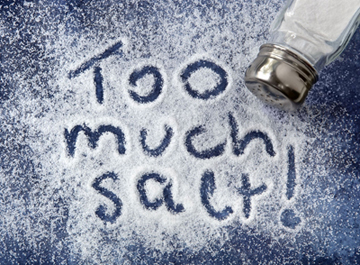Is using salt a bad habit?
- Do you automatically add salt to everything you cook without tasting it beforehand?
- Do you know how much salt you add to your cooking?
- What is the first thing you reach for when eating chips?
- Do you have salt on your table waiting to be added to your food before eating?
- Do you know how much salt is safe to consume per day?
Salt was originally used to preserve foods before refrigeration was invented. We now have refrigeration…
Properties
Salt is a mineral mainly made up of Sodium Chloride. It is a useful mineral if used in small amounts. 1 gram a day is all we actually require. Sodium helps to regulate water balance within the body.
The recommended maximum intake for an adult in the UK is just 6 grams (1 teaspoon) per day. In the UK, on average, we consume almost double that amount; around 10 grams per day.
Most of the salt we consume is eaten in convenience and processed foods, restaurant foods and takeaways. This is another reason it is always better to eat home cooked food as you know how much you have added.
Unfortunately, quite often it is unrealistic to be able to cook home made meals three times a day. In our busy and hectic lifestyles we often have to grab food on the run. However, you can make a different choice when opting to buy take out food. Get into the habit of opting for reduced salt meal options. Most of the big stores provide a low salt lunch choice and even some restaurants have jumped on the bandwagon.
It is estimated that even with giving up salt use in the home we would still be consuming more than enough just by eating out and by consuming convenience foods. Around 77% of the salt we consume is in processed foods, therefore making a different choice really will make a difference.
Health implications
Too much salt can lead to high blood pressure, leading to heart attacks and stroke. High blood pressure causes too much calcium to be excreted through the kidneys. This can lead to painful kidney stones. There is also increasing evidence of a link between high salt intake and stomach cancer, osteoporosis, obesity, kidney disease and vascular dementia and water retention. Salt can also exacerbate the symptoms of asthma and diabetes
People at higher risk of disease with a high salt diet
- People over age 50
- People who have high or slightly elevated blood pressure
- People who have diabetes
Reducing Salt
Reducing your salt intake at home is easy. I ‘gave up’ salt 10 years ago by simply not having any in the house. Eventually I caved in and bought some Himalayan Rock Salt which I use on the rare occasion that I eat chips. Chips are the only thing I ever add salt to. I very rarely feel the need to add salt to my cooking. I regularly use herbs, spices and different oils to give my home prepared foods a great flavour. In short my salt consumption was nothing short of a bad habit.
See the following tips for reducing your intake from the British Heart Foundation
Top tips for reducing your salt intake
Low salt food doesn’t need to be tasteless or bland. There are lots of things you can do to make sure your food is still exciting and satisfying.
- Check the nutritional information on food labels and try to pick low-salt options and ingredients
- Add less salt when cooking and don’t add salt to your food at the table. As you get used to the taste of food without salt, cut it out completely.
- Flavour your food with pepper, herbs, garlic, spices or lemon juice instead.
- Watch out for cooking sauces and seasonings like soy sauce or jerk seasoning -some of these are very high in salt.
- Swap salty snacks such as crisps and salted nuts with fruit and vegetables instead.
- Avoid saltier foods such as bacon, cheese, takeaways, ready meals and other processed foods.
Bad spaghetti!
I remember once, a long time ago, I nearly poisoned a friend by adding too much salt to a bolognese. I got so carried away with adding it whilst cooking. I didn’t bother to taste it and when I served it up you could practically see it crystallising on the plate! Yuk! It was really, really nasty. So you see, I haven’t always got it right but trial and error wins in the end. Giving up salt after that culinary disaster was not only better for me but also better for everyone around me!
Salt Free Challenge
Why not go salt free at home and see how you feel? Give yourself a 21 day challenge and see how different all your food tastes. Get creative with herbs and spices. Your taste buds will be singing and your body will be thanking you! Please do share your recipes and ideas. The more the merrier!
Help is at hand!
I hope you have found this article useful. If you need any further help with your IBS or any digestive health complaint please feel free to reach out to me and book your Free Phone consultation.
During this consultation we will go through your current symptoms in a thorough symptom analysis, discuss your current diet, provide you with some dietary advice and answer any questions you may have. There is absolutely no obligation to work with Glorious Food and this is a completely no cost consultation. You can book this here.
I hope you enjoyed this article. Please feel free to share amongst your family and friends.
Helen x

